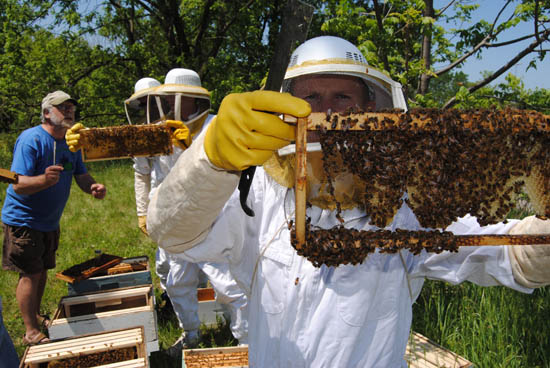
How many times have you been stung?
Ryan Keeling and Kristin Jones get that question a lot. Then again, the University of Michigan-Dearborn students don’t have conventional summer jobs.
Keeling and Jones are student naturalists at the University’s Environmental Interpretive Center (EIC), and they both spend a good deal of time with bees.
“Bees have always interested me,” said Keeling, a summer sustainability intern at the EIC. “Something about bees just sparks my drive for knowledge. The fact that bees can find their way back after flying thousands of miles every day is just amazing. The sheer geometry of their honeycomb and what they can come up with, it’s just amazing.”
Jones shares Keeling’s passion for the honey-making insects.
“I remember reading a book when I was in third grade regarding how bees find their way home,” she said. “The way that they work together is just very interesting.”
Students play a vital role in maintaining UM-Dearborn’s urban apiary by working on seasonal beehives and assisting with the annual honey harvest in late summer. The urban apiary project is one example of the sustainability initiatives underway at the EIC, said Director David Susko.
“All of these initiatives are meant to demonstrate to the public, as well as to the students on our campus, what they can do to promote sustainable city living,” he said. “And providing opportunities, such as what the students might experience at the urban apiary, are critical to get them involved in understanding their role in their communities and understanding their role that they play in the environment. The apiary offers a unique urban setting for multiple learning opportunities about beekeeping, whether the students are volunteering to maintain the beehives, undertaking laboratories there or conducting long-term research on colony success or failure.”
Keeling and Jones have grown so accustomed to working with bees that the insects no longer startle them.
“I’ve just learned that bees are very docile,” Jones said.
But just in case, they suit up in protective gear to prevent an attack. And to ease aggressive hives, they ignite small fires in hopes that the smoky scent calms the bees.
“We’re here to watch this grow, and hopefully, by next summer, we’ll be collecting lots of honey,” Keeling said.
As for their answer to the popular question, Keeling has yet to be stung on the job, while Jones has only one incident to speak of. She worked lake patrol and acquired her share of mosquito bites.
“I actually had one on my ankle, which I thought was just a mosquito bite, so I scratched at my ankle with my foot,” she said. “It was actually a bee crawling up my leg. That was my first and last time being stung. That experience just showed me that I had to provoke a bee, literally smash it on my leg, to sting me.”
Watch the video below to learn more about the University's urban apiary.





